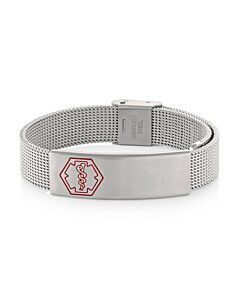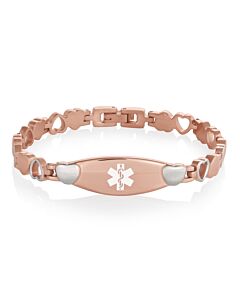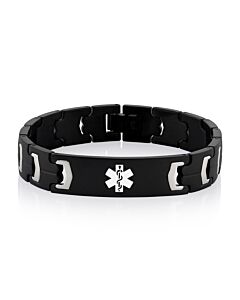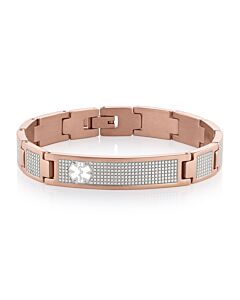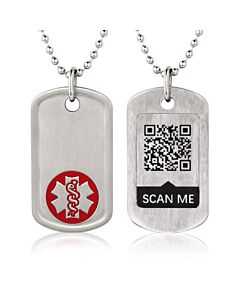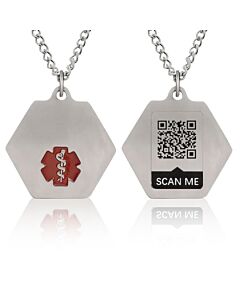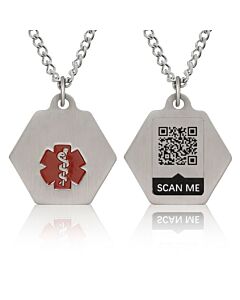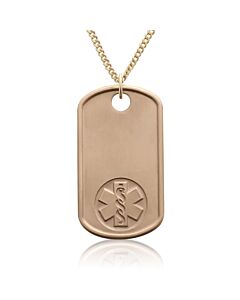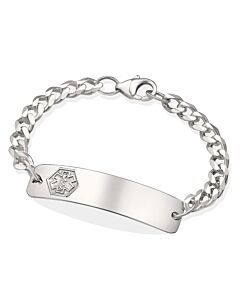

Medical IDs for Dementia
A medical ID is recommended for dementia. The World Health Organization defines dementia as a syndrome in which there is deterioration in memory, thinking, behaviour and the ability to perform everyday activities. By wearing a dementia ID bracelet or necklace, the wearer protects themselves in a medical emergency to ensure they receive proper medical care.
Worldwide, around 50 million people have dementia, and there are nearly 10 million new cases every year. Because dementia is not a physical disease but a cognitive one, it is considered an invisible disease. There are no immediate or apparent signs that a person has dementia. In an emergency, signs of dementia are not readily visible to responders unless a patient wears a dementia medical alert bracelet or necklace to alert others.
“Be sure your loved ones have some form of identification on them, and keep in mind they may take off certain items of clothing or lose their wallets. Multiple forms of identification, emergency contact numbers and disclosure of their medical diagnosis of dementia are a good idea, including an ID bracelet or pendant, identification inside their clothing and in their wallet.” - AARP
Common Safety Issues with Dementia
- Some symptoms of dementia can increase the risk of falls
- Problems with mobility, balance, and muscle weakness may increase the risk of physical injury
- Memory difficulty may lead to being lost or wandering
- Dementia medication side effects may lead to dizziness or low blood pressure
- Syncope, fainting, or transient loss of consciousness may be associated with dementia
“Wandering can pose a major problem for the caregiver and can be dangerous for a person who has Alzheimer's disease or another dementia. Get a medical ID bracelet for the person so that you can be contacted if he or she wanders away.” - Michigan Medicine
Medical IDs and Dementia in Emergencies
A study shows that older adults with dementia are more frequent visitors to emergency departments, returning at higher rates and incurring greater costs than older adults without dementia.
Dementia is an invisible medical condition, often without visible symptoms making it difficult for responders to recognize in an emergency. The National Institute on Aging also notes that a trip to the emergency room (ER) can tire and frighten a person with dementia. Medical IDs can alert others about the presence of this condition and allow them to take the necessary steps to ease distress.
What to Engrave on a Dementia ID Bracelet


Engraved information on a medical ID bracelet or necklace for dementia can be helpful to anyone responding to an emergency. In engraving a dementia alert ID, make sure that it contains accurate information that is easy to read, even in the most difficult situations like hallucinations, or when a patient refuses to be treated.
- Wearer’s full name to identify themselves in case of an emergency, getting lost, or wandering
- Dementia – include information about the wearer’s dementia and considerations such as if the patient may resist treatment
- Other medical conditions or disorders that may or may not be related to dementia - examples are heart disease, diabetes, kidney or bladder problems
- In case of emergency contacts
An emergency wallet card can also help offer more information in case of an emergency. Include details such as where the person lives, alternate emergency contacts, and a list of prescribed medications.
Our Adult Dementia Bracelet & Wristband Options
When researching options for dementia bracelets and dementia wristbands, look no further than Universal Medical ID. Featuring medical ID bracelets in many different styles and metal types, such as stainless steel, sterling silver, titanium, gold-filled/rolled gold, and 14 carat gold.
Our Dementia Necklace Options
If you are shopping for an ID necklace for dementia for a loved one, we also have you covered. Featuring necklaces that range from dog tag to beautiful pendant, you will be able to find a dementia ID necklace for your loved one.
Featured/Best-Selling Dementia Jewelry
When looking for the best ID bracelets for dementia patients, these popular styles are highly chosen by our customers.
Why a Dementia Wallet Card isn’t Enough
When setting up a medical ID for a loved one with dementia, it’s important to choose a visible medical ID such as a bracelet or necklace. An expandable wallet card is a great addition to a bracelet or necklace and can include additional medical information, emergency contacts, and more.
Are any Dementia Bracelets Non-Removable?
If you are shopping for non-removable ID bracelets for dementia patients, there are some designs and options that will work best for you. Please call us to review the unique circumstances so we can help you get your loved one the best bracelet or necklace for them.



 - US
- US  - Canada
- Canada  - Australia
- Australia 
